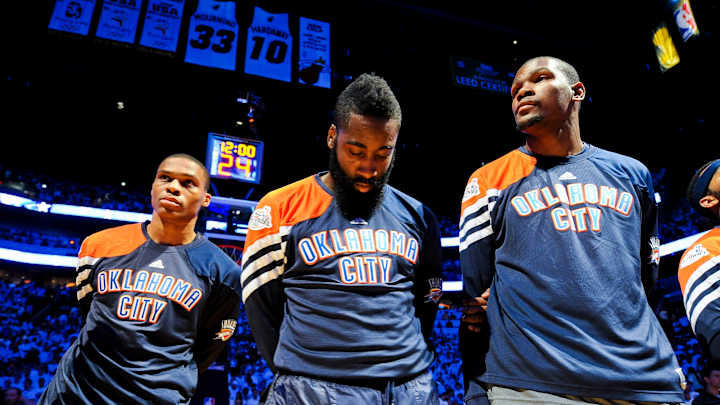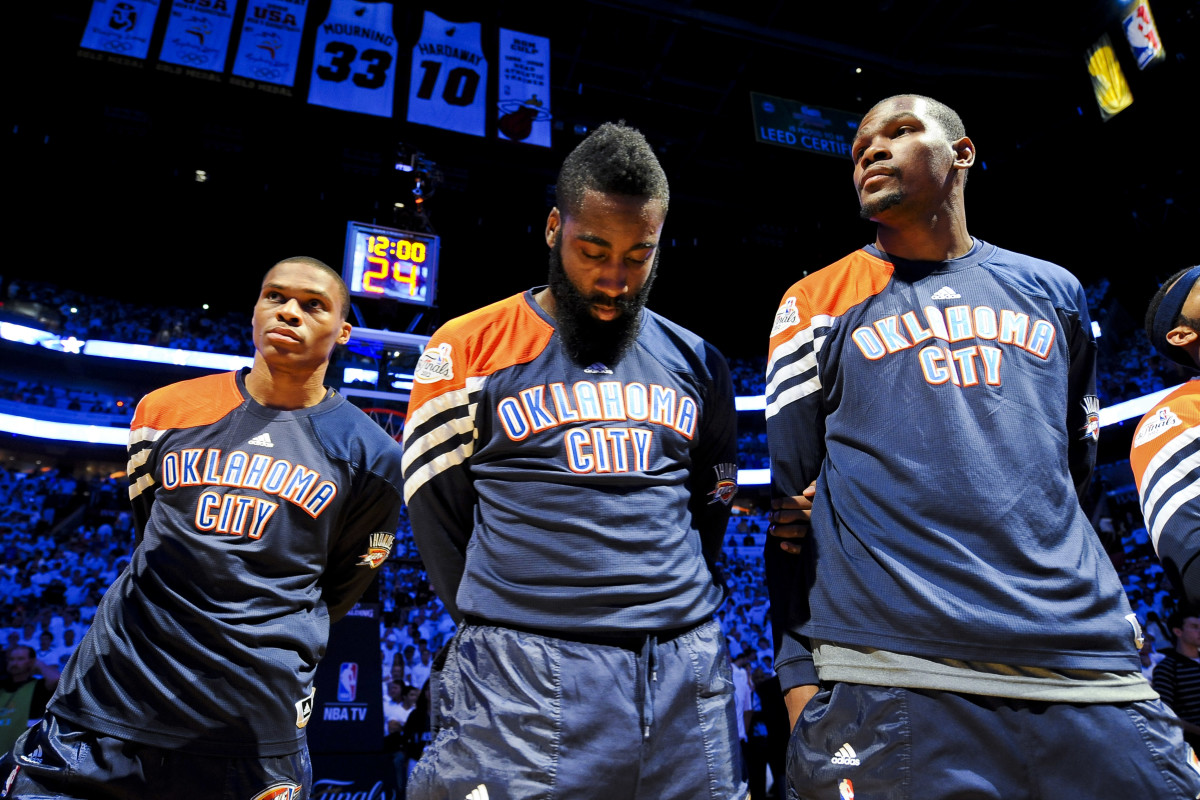Thunder strike a delicate balance in James Harden deal

Kevin Durant (right) and Russell Westbrook (left) will move on without James Harden in Oklahoma City. (Andrew D. Bernstein/NBAE via Getty Images)

By Rob Mahoney
The Sam Presti doctrine is nothing if not preemptive.
Rather than table their decision regarding James Harden's future in Oklahoma City until the trade deadline or 2013 free agency, Presti and the Thunder have startlingly opted to deal Harden to the Houston Rockets for rookie shooting guard Jeremy Lamb, veteran shooting guard Kevin Martin, two first-round picks and a second-round pick. That's a monumental decision for one of the best teams in the league to make just before the season opener and bears all kinds of implications for the Thunder:
• Let's get this out of the way up front: The best possible outcome for the Thunder was to keep Harden at any cost. Oklahoma City had the rare distinction of being a legitimate title contender poised for significant internal improvement, and that's not something a franchise should give up for the sake of hedging luxury-tax penalties.
But, oh, how easy it is to spend money from other people's wallets. As much as we like to pretend that the bottom line doesn't matter in situations such as these, each individual franchise has the privilege of making that determination for itself. The Thunder collectively stopped a few million short of offering Harden a max extension (again, per Wojnarowski), and that the negotiations completely fell apart from there is merely reflective of an unavoidable financial reality. The line was drawn, Harden wouldn't budge and OKC as a team will suffer a bit for it. Yet this trade does manage to marry the franchise's immediate contention with its long-term financial flexibility, a tough balance for any organization to maintain.
• It all begins with Martin, who will take on many of Harden's minutes and touches until his contract expires at the end of the season. Although Lamb and the two first-round picks provide the bigger incentives for the Thunder to push this trade through, Martin is the only reason it really works. Not only is his huge expiring contract of help to a team mindful of its cap obligations, but Martin is also a solid alternative source of complementary scoring now set for the role he was born to play. Putting Martin as the anchor of a first-unit offense dooms it to mediocrity. But either moving him to the bench or positioning him alongside elite shot creators has the potential to yield incredible results, a fact of which Presti and the Thunder are already undoubtedly aware.
That latent potential stems from the fact that Martin, even with last season's regression taken into account, is both an efficient isolation scorer and a terrific spot-up shooter. He's in a position to either create shots or defer based on particular lineup constructions and actually adds an element of off-ball movement that the Thunder offense has regularly lacked.
Martin is by no means a perfect, skill-for-skill replacement for Harden, but he may be the closest thing the Thunder could expect to get back in a financially motivated deal. Once the Thunder put their cap sheet ahead of their immediate title chances, they surrendered the ability to judge any trade in terms of its straight basketball value. Acquiring a player of Harden's caliber, after all, would likely require taking on a contract of Harden's inevitable pay grade. Adding a sub-star scorer like Martin along with prospective assets, on the other hand, allows the Thunder to keep their options open and their contending hopes alive. They preserve enough offense in this swap to stay in the West's top tier, even if their overall downgrade in talent does make things more dicey in terms of their specific matchups with both the Lakers and Spurs.
• Martin may be an abysmal defender, but it's not as if the Thunder have lost a lockdown type in Harden. This swap is merely an exercise in managing weakness. We've seen Oklahoma City do just fine by hiding Harden defensively and supporting him with back-line help from Serge Ibaka, Nick Collison and Kendrick Perkins. Whether they can fully do the same with Martin remains to be seen, but the cross-matching potential and system in place will give Scott Brooks all kinds of room for defensive adjustment. The trade-off on D is a concern for the Thunder, but hardly a glaring one.
• The most worrisome dips in Martin's game last season: shooting efficiency and free-throw rate. The former will undoubtedly reverse course now that Martin has superstar teammates to penetrate, draw double teams and do much of the creative work for him. Martin's 39.3-percent shooting clip on spot-up three-pointers last season (per Synergy Sports Technology) bodes well for the kinds of open looks he'll see playing alongside Kevin Durant and Russell Westbrook, and getting a fresh start on an outstanding team certainly won't hurt. Martin's distaste for the rebuilding bent of the Rockets could not have been more clear in his comments and on-court body language, and I suspect the direction of the Thunder will be more to his liking.
The sudden drop in free-throw attempts (both per game and per minute) is trickier to account for, and I have yet to find or hear of a convincing explanation. Some choose to blame the league's recent crackdown on the infamous "rip move," which was a Martin signature long before it was made famous by Durant. Others have cited his natural decline or some untriggered regression in his game. More likely than either is that Martin's foul-drawing collapse was an aberration in a weird, lockout-shortened season, the product of circumstance more than any attributable shortcoming. We'll find out if that's the case soon enough, but should Martin maintain his ability to rack up free throws at a rate roughly equal to his career average, he'll add to the foul-drawing abilities of Durant and Westbrook in the same way that Harden did. (Durant, Westbrook and Harden vaulted the Thunder to the league's best free-throw rate last season.)
• This move can be read as a big vote of confidence in Westbrook's playmaking abilities, but it's just as indicative of the value that Durant and reserve point guard Eric Maynor have in steadying Oklahoma City's offense. Between those three the Thunder should have the team-friendly shot creation necessary to curate an elite offense sans Harden, though only if Brooks reworks his rotation to reflect the lack of passing in Martin's game.
• Lest we forget: Lamb is the real return here and could prove to be the stylistic bridge between Harden and Thabo Sefolosha that the Thunder have so desperately been searching for. Over the last few seasons, the shooting guard rotation in Oklahoma City has boiled down to a difficult offense/defense substitution; Sefolosha's outstanding defensive work was undercut by inconsistent shooting, while Harden's star-level offensive contributions were offset by his lacking defensive game. Lamb's skill set is wide enough to avoid such directional concerns and offer Brooks an attractive long-term option on the wing without liability.
